Claudio Monteverdi was a musical revolutionary. Over the course of music’s history, few composers have had a more radical impact on their art than the Italian, whose 450th birthday will be celebrated on May 9. The brightest musical spark emanating from the cultural hotbed of the Renaissance courts of northern Italy, his compositional innovations changed music forever. Granted, he didn’t act single-handedly but his genius shines far more brilliantly than that of his contemporaries.
One of Monteverdi’s most important achievements is the introduction of drama to music. His 1607 work L’Orfeo is often referred to as the first ever opera – strictly speaking it isn’t but it is the earliest (and best) example we have of a successfully integrated large-scale musical drama. Monteverdi’s theatricality, though, was honed and developed in his madrigals: secular songs for several voices in which he explored music’s expressive and dramatic capabilities.

A new CD from Rinaldo Alessandrini and his Concerto Italiano, which brings together a number of madrigals from across Monteverdi’s career around the broad theme of ‘night’, provides ample evidence of this. Whether in the galloping rhythms and extraordinary rapid declamations of the Combattimento di Tancredi e Clorinda, the crushing discords and swooping gestures of the Lamento della Ninfa, or the bounding, skipping jollity of Quando l’Alba in Oriente, Alessandrini and co delight in the vibrant theatrics of this music. It never feels overegged, though: just fresh, insightful and enjoyable.
Alessandrini and co delight in the vibrant theatrics of this music
The liner notes are excellent, with full texts and thorough notes on each of the madrigals. Another great touch is the inclusion of five short instrumental Sinfonias across the disc, which break up the otherwise rather intense vocal texture of the madrigals.
Alongside secular music for the court, Monteverdi wrote a lot of church music; in fact he became director of music in Venice’s St Mark’s Cathedral in 1613. Three years prior to this, though, he published what has to be considered one of the true masterpieces of sacred music, his Vespro della Beata Vergine. It is a huge work, setting a dozen texts from the Vespers service to a staggering variety of musical styles, from solo songs to choruses with full-on instrumentation.
Another Italian group of early music specialists, or rather a conglomeration of groups, under the direction of tenor Giuseppe Maletto, has recorded this amazing piece and released it in time for the birthday celebrations.









